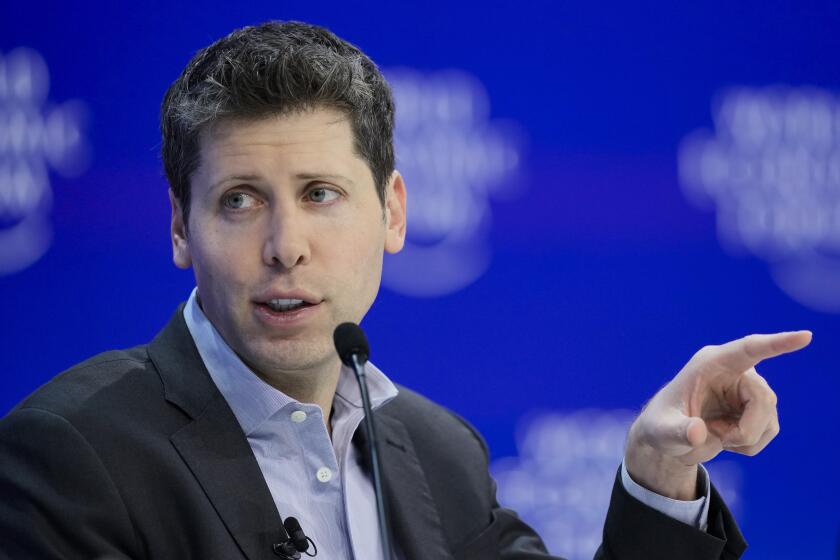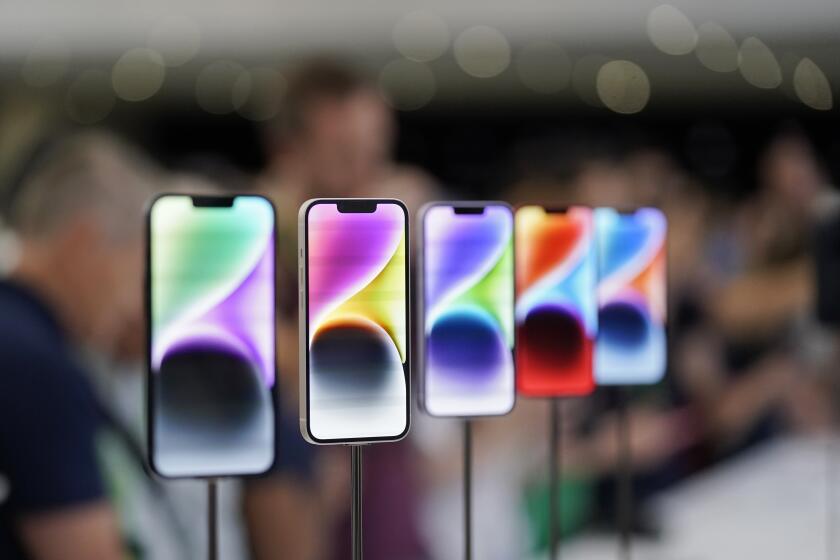
- Share via
Dani Schlarmann, a recruiter, noticed something fishy about the job applicants.
Cover letters and resumes sounded identical. Candidates embellished their experience to match the job description. On top of that, engineers were caught using artificial intelligence tools to “cheat” on live coding tests.
The California resident, who works for blockchain technology company Ava Labs, vented about his frustrations with AI on social network LinkedIn. To address the issue, Ava Labs started asking some candidates to sign an agreement that they will not use AI assistance during their interviews, he said.
“We’ve had a few people fight us back on it and say ‘we should be able to use any tool at our disposal.’ Honestly, this is not the company for you, then,” said Schlarmann, who lives in Corona. “For engineers, we pride ourselves on coding prowess and there are going to be times when the AI can’t solve something for you.”
The latest $40-billion investment round will bring the ChatGPT’s valuation to $300 billion.
Job seekers use AI-powered tools to help them improve their resumes, find jobs, auto apply to hundreds of roles and even provide answers on the spot during video interviews. Fueled by the popularity of AI-powered tools like OpenAI’s ChatGPT, tech giants and startups are racing ahead to release more AI features that can spit out text, code and images within seconds.
But the AI frenzy has also sparked a debate about when technology goes too far, distorting a job candidate’s true skills and experience. Faced with more competition as companies slash thousands of workers, job seekers are weighing whether to pay for AI tools that might help them land a role more quickly. Employers and recruiters are also grappling with whether job candidates should be allowed to use AI even as they embrace the technology themselves.
Julie Schweber, senior HR knowledge advisor at the Society for Human Resource Management, said employers know that job candidates could be using AI to enhance their resume or cover letter — but they don’t want people misrepresenting themselves.
“It certainly makes sense because you want a candidate that is evolving with the technology and not afraid of technology,” she said.
Some companies don’t specify whether job candidates can use AI and others do. Anthropic, a San Francisco AI startup, asks job applicants to agree they won’t use AI assistance to answer certain questions because the company wants “to be able to assess people’s genuine interest and motivations for working at Anthropic.” Amazon said that when applicable, it will ask candidates to acknowledge that they won’t use generative AI during an interview or test.
Jeremy Pihl, who became unemployed last year for the first time at 51 years old, said he has used AI tools such as ChatGPT, Swooped and 6Figr during his job search.
“If you are not leveraging AI, I promise it’s being leveraged on you,” he said.
Recruiters use AI to generate job descriptions, review or screen candidate searches, automate candidate searches and other tasks, according to SHRM.
Pihl, who previously worked as a customer success manager at Coda and a solutions engineer at Apple, is still trying to land his next role despite already applying to roughly 1,500 jobs.
AI has helped him research a potential employer and improve cover letters, but using the tools to auto apply to jobs hasn’t yielded much success, he said. Pihl, who secured a contract role but is still job hunting, said the progress he has made has been through referrals or reaching out to a hiring manager who viewed his LinkedIn profile.
“I don’t know that I would lean on it to the extent that I leaned on it in the beginning,” he said. “There’s an aspect of it where it is really helpful.”
Meanwhile, the job search is only getting more fierce. Nearly 60% of people globally will be looking for a new job in 2025 and 37% are applying to more jobs than ever before but hearing back less, according to LinkedIn research.
A petition signed by nonprofits, foundations and labor groups was sent to the state attorney general on Wednesday, urging him to halt OpenAI’s plans to restructure the nonprofit’s commercial arm into a for-profit business.
In March, the unemployment rate rose slightly to 4.2 % with 7.1 million people out of work, according to the U.S. Bureau of Labor Statistics. In February, the number of job openings reached 7.6 million, down from 8.4 million compared with the same month in 2024.
As California tech companies continue to slash payrolls, the state’s unemployment rate has been higher than the national average. In February, California’s unemployment rate was 5.4 % with more than 1 million people unemployed in the state.
Sunnyvale, Calif.-based LinkedIn has been testing AI-powered tools on its platform, including one to match candidates with jobs that are a better fit. Rohan Rajiv, head of careers products at LinkedIn, said there’s no doubt it’s taking more interviews for people to land jobs, but both recruiters and job candidates want to spend as little time as possible in the process.
“We are finally at a point where it has become realistic for us to not play the volume game, for us to actually play a really focused game,” he said.
Nearly 40% of LinkedIn Premium subscribers use AI features to improve their profile and stand out and nearly a third have used the platform’s AI-powered job search features. Most have found it helpful, according to LinkedIn.
But there are some controversial uses of AI as well. One such example: a teleprompter that provides AI-generated answers to job interview questions.
Final Round AI, which offers an AI-powered interview assistant and other tools for a subscription fee, makes the bold claim that candidates can land their next job in 30 days or less.
In some of the startup’s viral videos on social media, people are reading AI-generated answers verbatim displayed on a screen during remote mock job interviews.
Founded in 2023, the San Francisco firm said it had more than 1 million users from January to February.
Using an AI interview or coding assistant could rub some employers the wrong way, but the entrepreneurs who created the tools say they’re just trying to support job seekers who are navigating a terrible job market.
Michael Guan, chief executive and co-founder of Final Round AI, said people’s perception of AI is changing and whoever understands how to use the technology will get an edge. Inspired by the superhero Iron Man, who has an AI assistant known as J.A.R.V.I.S., Guan envisions a future where these tools will be even more intuitive.
“Imagine I have a teleprompter on my eyeglasses …,” he said. “Everybody can become Iron Man.”
Kaivan Dave, who heads marketing at Final Round AI, said that using an AI interview assistant can help candidates, some who might have language barriers, better articulate their thoughts. Even the president, he said, has used a teleprompter.
The venture capital-backed company created a billboard in San Francisco with an image of President Trump that read “Interview Confidently Like Our President. Helping America Get Back to Work 10x Faster with Final Round AI.”
“I don’t think that this is going against any type of unethical norms,” Dave said.
Using an AI interview assistant still doesn’t fly with some recruiters.
Lyndsi Okh, a San Diego resident who recruits for tech nonprofits, said she suspected a candidate interviewing for a relationship building role was reading AI-generated answers because of their speech patterns and pauses.
“Using AI to help prepare for interview questions is fine, but reading off a screen with interview responses is a total breach of trust and a big no-no for me,” she said.
Although she has nothing against the use of AI, Okh said the ones who are using it successfully are not relying on technology to replace critical thinking.
“We’re in the Wild West of AI, where it’s like no one knows what to do, and everyone’s just doing anything,” she said. “I think that it will eventually be refined.”
For now, nothing beats a response that feels personal.
More to Read
Inside the business of entertainment
The Wide Shot brings you news, analysis and insights on everything from streaming wars to production — and what it all means for the future.
You may occasionally receive promotional content from the Los Angeles Times.













